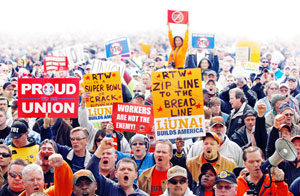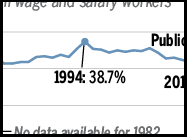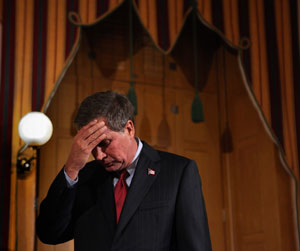CQ WEEKLY – COVER STORY
Feb. 4, 2012 – 2:13 p.m.
Labor on the Line
By David Harrison, CQ Staff
Back in early 2009, as President Obama was settling into the Oval Office, American labor unions allowed themselves to dream. Unions had come out in force for Obama’s campaign and were thrilled with the first bill the new president signed — the Lilly Ledbetter Fair Pay Act — which made it easier for workers to sue over discriminatory pay.

|
||
|
Up ahead was the Employee Free Choice Act, otherwise known as “card check,” a legislative proposal high on labor’s all-time wish list that would make union organizing drives much easier and faster, permitting certification if a majority of the employees in a company signed cards joining a union. It represented a chance to start reversing decades of dwindling membership and declining political clout.
Labor could not have asked for friendlier legislative leaders. Rep.
But the euphoria did not last. Democrats could not get the votes to overcome a filibuster on card check after centrists balked in the spring of 2009. By then, the Obama administration had moved on to the health care overhaul and was not inclined to waste political capital on a doomed legislative effort.
It would get worse. Tea party-backed Republicans not only took the House in the 2010 midterms but also swept into power in state capitals. They had their own wish lists.
What followed were state efforts to roll back public employee collective bargaining rights — epitomized by last year’s fight in Wisconsin — and a push on Capitol Hill to hamstring the National Labor Relations Board (NLRB), the agency charged with mediating disputes between workers and employers and implementing workplace unionization rules.
Today, unions are fighting for survival on multiple fronts. Indiana last week became the first state in 10 years and the only state ever in the industrial Midwest to adopt a right-to-work measure that forbids unions from collecting dues from non-members as a part of their contract. Right-to-work momentum is gathering in other states, such as Michigan and Minnesota. And Arizona lawmakers are rushing bills banning collective bargaining for public employees through the legislature.
Few state officials have been as aggressive as South Carolina Gov.
The drive has spilled over into the GOP presidential campaign, where Mitt Romney, the party’s front-running candidate, has blamed unions for slowing economic growth and innovation.
On Capitol Hill, Republican lawmakers are jostling to take the hardest line against labor unions.
The Republican Party and America’s labor movement have been at odds for a century. But this round has gone well beyond the usual jousting and represents a challenge to the foundation of the labor movement: the ability of employees, particularly public employees, to organize and bargain collectively.
“We’re talking really now about a direct attack on the rights of Americans to freely associate with their peers, the rights given to them in the law to decide whether or not they want a union,” Miller said in a speech last fall.
Labor on the Line
“To some extent this goes in cycles, although this is clearly the worst I’ve seen in a long time,” says AFL-CIO legislative director Bill Samuel. “I can remember a day, back in the 1970s, 40 or 50 Republicans routinely voted to defend unions and collective bargaining. We actually lost a lot of Southern Democrats.”
“I don’t recall so much attention to collective bargaining or labor-related issues in my lifetime,” says Marick F. Masters, a business professor at Wayne State University in Detroit. “I remember presidential campaigns since 1968, and I don’t recall labor as having been a significant issue in any of them.”
Why Now?
This battle is happening now due to “a confluence of events,” says Minnesota Republican Rep.
State government revenue shortfalls around the country have focused attention on generous public union contracts and encouraged conservatives to blame the unions for deficits. Cuts in state workforces have triggered fights with public employee unions.
At the same time, Republicans, who consider the Obama administration beholden to labor interests, have honed their anti-union message. From the aborted card check effort to Obama’s recess appointment of longtime union official Craig Becker to a spot on the NLRB, conservatives have made the administration’s union connections a central part of their Obama critique.
Finally, the NLRB’s complaint against Boeing Co., charging that the company opened a factory in South Carolina to retaliate against unions in Washington state, gave Republicans even more ammunition. To them, it was inconceivable that a federal agency should go after a major corporation that was hiring some 1,000 new workers in a tough economy. Boeing and the machinists union have since settled, ending the case before it really got going.
The ultimate goal, Kline says, is to “thwart some of this union favoritism that we’re seeing.” Republicans say they can help the economy by reducing the number of new pro-union rules promulgated by the administration. “It would get rid of some of the uncertainty that’s out there,” Kline says. “Employers need to have confidence about what’s coming down the road and consumers need to have confidence about what’s coming down the road.”
To anti-union activists, this is a chance to throttle unions of government workers, which they have long opposed on philosophical grounds.
While private employers are free to negotiate with unions, governments should not be forced to deal with a “monopoly bargaining agent,” says Mark Mix, president of the National Right to Work Foundation. “What we’re doing here is we’re taking a private organization and we’re putting them between taxpayers and their elected officials.”
Labor is no passive onlooker in this fight. On the 2012 campaign trail it is gearing up for its “largest ever” role in state and federal elections, according to AFL-CIO Political Director Mike Podhorzer. By organizing effective recall efforts and referendums in Wisconsin and Ohio, union activists have also made the anti-labor crusade potentially hazardous for Republicans if voters think they’ve overreached.
But labor is fighting back without much explicit backing from the Obama White House, infuriating union officials and their allies. Republicans, meanwhile, see in this fight a chance to advance their anti-regulatory agenda while also kneecapping an important Democratic donor base.
Union officials say their members, who have fought to keep their health benefits and pension plans, have been turned into scapegoats by conservatives intent on driving a wedge between union and non-union workers.
Labor on the Line
The governors who have challenged unions in Indiana, Wisconsin and Ohio have argued that union-negotiated salary and pension benefits are unaffordable in the age of crushing state budget deficits. In particular, they say the states can no longer afford the retiree benefits won through collective bargaining that have saddled the states with billions in unfunded pension liabilities.
To unions, however, the bills backed by these Republicans have been aimed at disrupting a last bastion of union and Democratic political power.
The rate of union membership is roughly five times as high among public sector workers as it is in the private sector, where it has been declining steadily. Whereas labor unions’ strength once derived from their millions of members employed in manufacturing, today it increasingly comes from public workers such as government employees, teachers, police officers and firefighters.
But there is evidence that the state legislation and public sector job cuts have taken a bite out of membership. Last year, almost 7.6 million government workers were union members, the lowest number since 2007, according to the Bureau of Labor Statistics. That’s a membership rate of about 37 percent, compared with a membership rate of 6.9 percent for private-sector workers.
It didn’t take long for Washington to mimic what was happening in the states. In March, Republican Sen.
GOP presidential contenders, meanwhile, have taken up the anti-union cause, trying to link labor with the “crony capitalism” they accuse Obama of practicing and making it part of their narrative of American decline.
“If you want to get America going again,” Romney said Jan. 19 during debate in South Carolina, “you’ve got to stop the spread of crony capitalism. [Obama] gives General Motors to the UAW. He takes $500 million and sticks it into Solyndra. He stacks the labor stooges on the NLRB, so they can say no to Boeing and take care of their friends in the labor movement.”
Romney says he supports DeMint’s national right-to-work bill. So does Rick Santorum, even though he opposed a national law while in Congress. Newt Gingrich says he wants to abolish the NLRB.
The Boeing complaint riled up Capitol Hill as well. Outraged Republicans filed numerous bills taking aim at the NLRB, an independent agency, and refused to confirm any of Obama’s Democratic nominees to the board, threatening to deny it a quorum that would have paralyzed it.
Recall Backlash

|
||
|
Labor is fighting back. After Republican Gov.
In November, Ohio voters repealed the law by a convincing 61 percent to 39 percent. Union officials called it a major victory in their attempts to hold the line against anti-union state officials. It was also a significant show of organizing strength in a heavily unionized industrial state that has emerged as a crucial battleground in presidential campaigns.
Labor on the Line
“We’re pretty confident that result in Ohio this last November foreshadows next November if Obama and presumably Romney are fighting about what to do about the economy and about jobs,” Podhorzer says.
Unions are pursuing a similar strategy in Wisconsin, where state officials are currently reviewing petitions asking for an election to recall GOP Gov.
Republicans caution against reading too much into these developments, however.
“Union leadership and union members are two very different things,” says Mark Graul, a Wisconsin Republican political strategist. “As you did in 2010, you’ll have plenty of union members in 2012 who are going to vote for the governor, particularly some of those private-sector union folks who have been paying more than public sector unions for their benefits and their retirement funds.”
On the national stage, unions have been supporting the NLRB against Republican attacks. But they’re doing it without much support from national Democrats. Obama, in particular, has said very little about the unions’ ongoing struggle. That has not gone unnoticed.
“I’m very disappointed in the White House silence on the attacks on organized labor,” Harkin said in an interview, adding that in 2008 labor went all out for Obama.”
Still, Harkin conceded that Obama has made some important moves, from the signing of the Lily Ledbetter Act to Becker’s appointment to the NLRB. In January, Obama also infuriated Republicans by using his recess-appointment power to fill three vacant seats on the NLRB, even though the Senate was holding pro forma sessions.
“I just want the administration to come out fighting,” Harkin said. “I want them to do some heavy lifting for labor because labor does the heavy lifting for them.”
Harkin was particularly dismayed that the White House did not contact him before Obama visited Cedar Rapids, Iowa, last month. There’s a foreign-owned unionized plant in Cedar Rapids that is bringing jobs into the country; Harkin wanted the president to visit it. Instead, Obama went to Conveyor Engineering and Manufacturing, a non-union factory.
“These are little signals that could have been sent,” he said.
AFL-CIO President Richard Trumka has warned Democrats not to take union support for granted. The unions will help only “those people that help us,” he said last spring at a National Press Club event. “If leaders aren’t blocking the wrecking ball and advancing working families’ interests, working people will not support them,” he said. “This is where our focus will be — now, in 2012 and beyond.”
Trumka has been especially outspoken in criticizing the administration for pushing into law a free-trade deal with Colombia, where 51 union members were killed in 2010.
There is more than a little bluff to Trumka’s threats. When the campaign heats up, union political action committees will probably decide that Obama and congressional Democrats are a more palatable choice than the GOP alternatives. And Trumka has toned down his comments in recent weeks, praising Obama’s State of the Union speech as having “voiced the aspirations and concerns of those who are too often ignored.”
Labor on the Line
“If the direction that President Obama is going to go in is to be more forcefully for job creation and to realize that unemployment is a much bigger problem for Americans than the debt ceiling or all these other issues, then I think we’re going to be much more favorably disposed toward him,” Podhorzer says. “There’s no question that we’ll take a big role, the largest ever, in the election.”
Besides federal races, “we’ll be investing resources in state races because of the kinds of attacks that were unleashed by the Republicans taking control of governorships and statehouses,” he says.
But the Democrats’ hesitant embrace of labor unions can be seen as a reflection of organized labor’s loss of political clout. As membership has sunk, so has the public’s opinion of unions. Only 52 percent of respondents had a positive view of labor unions last year, according to Gallup, down from 65 percent in 2003, a drop partly attributable to the flare-ups in Wisconsin and other Midwestern states.
Of course, unions can still organize impressive door-knocking campaigns and get-out-the-vote drives. And the Center for Responsive Politics reports that labor-affiliated political action committees are among the strongest in the country. Labor PACs account for five of the 20 largest PACs so far this cycle, according to the nonprofit group. And their money is heavily directed toward Democrats. But even there, labor is losing some of its edge. A report last year by the center found that labor PACs accounted for roughly a quarter of all PAC money given to Democrats in 2010, down from 40 percent in 2000. Business PACs have more than made up the difference, boosting their contributions to Democrats.
Ideology and Money

|
||
|
On Capitol Hill, the GOP’s targeting of the NLRB fits neatly into the party’s anti- regulatory agenda. One of the factors restraining job growth, according to conservative lawmakers, is the thick tome of union-related rules and regulations imposed by the NLRB that employers must follow. That forces small-business owners to hire attorneys and consultants to help them navigate union elections or the collective bargaining process and reduces their ability to invest in their businesses and hire new workers.
“I’ve been accused of being anti-worker and I really do take exception to that,” says Kline, who sees himself as representing the interests of the 89 percent of workers who are not union members. “Their rights have to be protected.”
Besides their philosophical objections, Republicans have political reasons to attack unions. Not only does impeding labor’s ability to organize and raise money appeal to conservative voters, it also reduces the amount of PAC money available to Democratic candidates. Simultaneously, Republican candidates are increasingly bankrolled by anti-union funders. For instance, Sheldon Adelson, a major Gingrich supporter, has long fought organized labor in Las Vegas.
If the legislation adopted in Wisconsin or Indiana were to be replicated nationwide, “that would clearly hurt labor’s ability to raise money,” says Masters, the Wayne State University professor. “Labor has the capacity to bankroll campaigns. I think it’s hard to read it any other way. It’s the elephant in the room.”
That could explain why Republicans paint labor’s political efforts as simply an attempt by a major, unaccountable institution to keep money flowing out of the paychecks of working people.
“People have this notion that labor law is about labor versus business,” says the National Right to Work Foundation’s Mix. “It’s not. This is about two large cartels that are dividing up the spoils, and the person that is missing in the debate is the employee.”
With many workers struggling to keep their jobs and make their payments, it can become easy to “scapegoat” union members who have held on to their wages, health care benefits and pensions, says the AFL-CIO’s Samuel.
Labor on the Line
Somehow, he says, the unions’ victories on behalf of their members have been cast as a bad thing. “Talk about class warfare,” he said.
Even more dramatic than the general public’s loss of labor support has been the sharp drop in Republicans’ opinion of labor unions, according to Gallup’s polling. Whereas about half of Republicans said they had a favorable view of unions in 1999, only about a quarter said so in 2011. By contrast, Democrats don’t seem to have changed their views much over that period, with approval ratings hovering in the high 70s. That means Republicans can appeal to their base by attacking labor without risking any electoral repercussions.
Republicans have done a “terrific job” of painting labor unions as greedy and obsolete, says Lee H. Adler, a professor of labor law at Cornell University.
“The policies that organized labor is pursuing and advocating are quite inside the mainstream of America and American law, but now they’re being pushed as something that is old, salty, not valuable and something that big government is pushing,” he says.
It used to be relatively easy to find pro-labor Republican lawmakers, such as former Sens.
Today, Republican support for unions seems gone forever. The party has tilted so far to the right in recent years that labor officials have given up trying to forge alliances with it. Labor’s fate will be increasingly tied to the fate of the Democratic Party and its success in elections, particularly the one on Nov. 6, 2012.
FOR FURTHER READING:
DeMint bill is